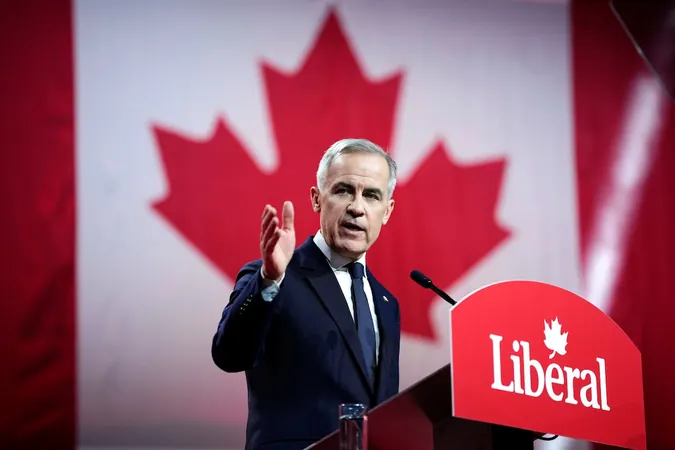
Canada Reassesses Defense Alliances Amid U.S. Tensions: A Shift Toward Europe and Beyond
2025-03-20
Author: Wai
Introduction
In a bold move against perceived threats from the Trump administration, Canada is actively redefining its defense strategy by seeking to strengthen ties with European nations and explore other international partnerships. This decision comes on the heels of President Trump's controversial remarks about possible economic punishment and even the annexation of Canada, which have sparked significant concerns across the Canadian government.
Strengthening European Ties
Foreign Affairs Minister Melanie Joly recently confirmed the country’s ongoing negotiations with various European officials to form a joint defense alliance that would involve collaborative projects for procurement. Joly emphasized the urgent need to diversify defense procurement, citing Canada’s over-reliance on American military equipment as a concerning vulnerability.
Rising Tensions with the U.S.
The tensions reached new heights earlier this month when Trump imposed a staggering 25% tariff on a range of Canadian products, threatening to weaken Canada's economy unless the nation agreed to become the 51st state of the U.S. These aggressive tactics have fostered a climate of distrust towards the U.S. in Canada, leading to a reevaluation of existing defense relationships.
New Partnerships in Defense
“We need new partnerships,” Joly expressed, reflecting the Liberal government’s intent to chart a fresh path in national defense policy. While the specific EU nations involved in the discussions are not disclosed, the government is reportedly advancing swiftly in these negotiations.
Review of Key Defense Contracts
During a news conference, Prime Minister Mark Carney addressed Canada’s significant contracts with Lockheed Martin for the purchase of F-35 fighter jets, valued at approximately $13.2 billion (19 billion Canadian dollars) for 88 aircraft. He announced a comprehensive review of this procurement, linking it to Trump’s ongoing trade conflicts. While Canada has only committed to purchasing the initial 16 jets, Carney is exploring alternative defense options with French and British officials, considering whether these aircraft could be manufactured domestically.
Partnership with Australia
As part of this strategic reassessment, Canada also looks to initiate a partnership with Australia that focuses on developing an over-the-horizon radar system aimed at Arctic defense. This collaborative project, valued at $4.2 billion (CA$6 billion), will leverage Australia’s advanced Jindalee Operational Radar Network, allowing Canada to enhance its surveillance capabilities rapidly.
Domestic Defense Significance
Prime Minister Carney underscored the significance of domestic defense by stating, “International institutions and norms that have kept Canada secure are now under scrutiny. The shifting priorities of the United States suggest we must reconsider our strategic alignments.”
Criticism of the New Strategy
However, the move to recalibrate Canada's defense capabilities is not without its critics. Executives within the Canadian defense industry caution that antagonizing the U.S. could have unintended consequences for government contracts. Bombardier CEO Eric Martel pointed out the potential risks tied to existing agreements with the Pentagon, emphasizing the need for a balanced approach.
Investment in Local Capabilities
Amid all this, Carney has been vocal about the necessity of boosting Canada’s defense budget and investing in local military capabilities rather than funneling the majority of resources toward American firms. "We need to spend more of that money here in Canada," he insisted, advocating for national investment in defense infrastructure.
Political Implications
As the political landscape heats up, Carney is expected to announce a federal election soon, marking a crucial time for Canadians. The challenges posed by the Trump administration are poised to be central themes in the upcoming electoral debates, as Canada navigates an uncertain future in its defense posture.
Conclusion
Canada's attempts to realign its defense ties away from the U.S. signify a critical juncture in the nation’s military strategy, reflecting a growing desire for independence and security in the face of external pressure. As negotiations with European allies advance and new partnerships form, the world will be watching how Canada adapts to maintain its sovereignty and enhance its defense capabilities.




 Brasil (PT)
Brasil (PT)
 Canada (EN)
Canada (EN)
 Chile (ES)
Chile (ES)
 Česko (CS)
Česko (CS)
 대한민국 (KO)
대한민국 (KO)
 España (ES)
España (ES)
 France (FR)
France (FR)
 Hong Kong (EN)
Hong Kong (EN)
 Italia (IT)
Italia (IT)
 日本 (JA)
日本 (JA)
 Magyarország (HU)
Magyarország (HU)
 Norge (NO)
Norge (NO)
 Polska (PL)
Polska (PL)
 Schweiz (DE)
Schweiz (DE)
 Singapore (EN)
Singapore (EN)
 Sverige (SV)
Sverige (SV)
 Suomi (FI)
Suomi (FI)
 Türkiye (TR)
Türkiye (TR)
 الإمارات العربية المتحدة (AR)
الإمارات العربية المتحدة (AR)